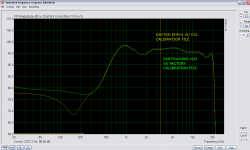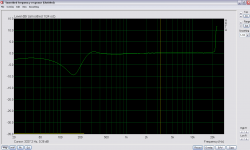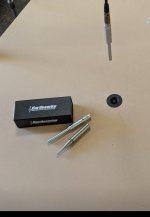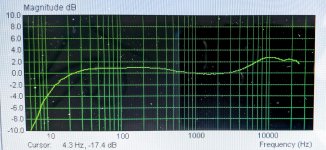I did a quick FR comparison of the Earthworks M23 and the Cross spectrum labs calibrated Dayton EMM-6, thought I'd share. The CSL mic was calibrated 5 years ago, and the M23 was calibrated last fall.
The setup is just a Vifa tweeter in a 4x4 baffle, with the mic 12 inches from the baffle. The measurements are gated, so data below ~~1kHz or so is not meaningful. Both measurements are compensated with the calibration curves supplied by CSL and Earthworks.
1st image is the raw responses, 2nd is the difference between the two.
You can see the CSL mic is certainly good enough as long as the calibration file is used, even after 5 years. Without the calibration file (not shown) it is not usable. The Earthworks M23 is excellent with or without the calibration file.



The setup is just a Vifa tweeter in a 4x4 baffle, with the mic 12 inches from the baffle. The measurements are gated, so data below ~~1kHz or so is not meaningful. Both measurements are compensated with the calibration curves supplied by CSL and Earthworks.
1st image is the raw responses, 2nd is the difference between the two.
You can see the CSL mic is certainly good enough as long as the calibration file is used, even after 5 years. Without the calibration file (not shown) it is not usable. The Earthworks M23 is excellent with or without the calibration file.



Those are great results. They may be using capsules from the same vendor. And the stability of the Dayton is also encouraging. You most likely would see differences above 20 KHz which may not be particularly relevant.
I'd be surprised if it's the same capsule. The Earthworks is a $500 mic that is +/- 0.3db, while the emm-6 is a $50 mic that is +/- 2db or so.
This is more an evaluation of the CSL calibration file using the earthworks mic as a standard. Not evaluating the mics per se.
The Earthworks originally used selected Panasonic capsules. They have changed since Panasonic got out of that business. The similar resonances in the plot suggest they may be the same capsule (my guess is a Primo). Earthworks selects and pre-ages their capsules to get stability and maximum flatness and then some electronic tweaking so they do bring a lot of value. Unfortunately the next step from the ECM capsules for precision measurements are the metal diaphragm capsules (like B&K) and those cost quite a bundle.
I use the ECM mikes for day to day measurements and they work fine. i have an extended set of B&K's but I use those for special tests and calibration efforts. They are too expensive and too involved to risk on day to day testing.
I use the ECM mikes for day to day measurements and they work fine. i have an extended set of B&K's but I use those for special tests and calibration efforts. They are too expensive and too involved to risk on day to day testing.
The Earthworks originally used selected Panasonic capsules. They have changed since Panasonic got out of that business. The similar resonances in the plot suggest they may be the same capsule (my guess is a Primo). Earthworks selects and pre-ages their capsules to get stability and maximum flatness and then some electronic tweaking so they do bring a lot of value. Unfortunately the next step from the ECM capsules for precision measurements are the metal diaphragm capsules (like B&K) and those cost quite a bundle.
I use the ECM mikes for day to day measurements and they work fine. i have an extended set of B&K's but I use those for special tests and calibration efforts. They are too expensive and too involved to risk on day to day testing.
Ok, clearly you know a lot more about this than I do, which is not a lot. I assumed the only resonances that would be seen in the data would be from the tweeter or maybe from the calibration standard that was used to generate the calibration curves. I'm curious to know which resonances you're referring to.
Regarding the capsules, I imagined earthworks is using relatively inexpensive graded/selected capsules from someone reputable, while Dayton/behringer is using capsules made from recycled tin cans in Bangladesh. But that's not based on anything other than my own imagination. I would still be surprised if they used the same capsules, although maybe I shouldn't be.
I bought the earthworks mic because I didn't trust the CSL calibrated ECM mic. Now I trust the calibration and I don't need the Earthworks any more. A metal diaphragm mic would be nice but it's nether necessary nor in the budget.
...and I don't need the Earthworks any more.
Can I have it?
Can I have it?
It's actually been sold but very funny.
How off where the dayton mic without calibration?
About 3 db at 10khz, see attached.
There's also 1db of shelving (not sure if this is the best word) from roughly 300 to 800 khz, however I was not able to verify this against the Earthworks mic. If I had more time I would have done a lower frequency measurement on a pole. For now I will give CSL the benefit of the doubt.
I also compared a newer Dayton mic (bought late 2018) and I was able to verify the included calibration supplied by Dayton is not accurate. The calibration was also very ragged, but the response of the mic is smooth. No surprise since others have reported the same thing. For the extra $25, buying a mic from CSL is well worth it. The only downside is they are frequently out of stock.
Attachments
Thank you very much!
The response looked better then I thought it would, I wonder how good the best samples of emm-6 measures, some may be good even without a cal file? If so, CSL could sell those mics for some more
Here are measurements from 85 different ecm8000s:

I'm not sure what the difference is between the ECM8000 and the EMM6 although they look identical. Cross spectrum used to sell the ECM but according to their website quality went downhill and they switched to the EMM6.
- Status
- This old topic is closed. If you want to reopen this topic, contact a moderator using the "Report Post" button.
- Home
- Design & Build
- Equipment & Tools
- Earthworks M23 and CSL EMM-6 measurement mic comparison
